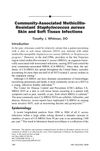November 2004 in “Emergency Medicine News” CA-MRSA is a growing health issue needing new treatments and better hygiene to prevent spread.
13 citations
,
May 2010 in “Dermatologic Clinics” Recurrent furunculosis can be managed with antibiotics, decolonization, and decontamination, with potential future use of vaccines and bacteriophage therapy.
 18 citations
,
November 2008 in “Disease-a-Month”
18 citations
,
November 2008 in “Disease-a-Month” A common cause of skin infections in the U.S. is a strain of bacteria resistant to certain antibiotics, and prevention focuses on cleanliness and avoiding close contact.
 2 citations
,
July 2008 in “Hair transplant forum international”
2 citations
,
July 2008 in “Hair transplant forum international” MRSA infections can occur in hair transplant surgeries, so it's important to test for it before treatment, keep everything clean, and follow treatment based on test results.
 April 2007 in “Dermatologic Clinics”
April 2007 in “Dermatologic Clinics” Understanding drug effects and careful monitoring are crucial for safe and effective dermatology treatments.


